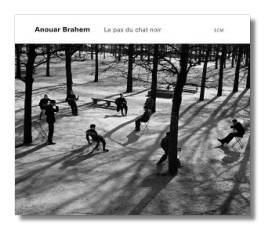
The Internet's Premier Classical Music Source
Related Links
- Latest Reviews
- More Reviews
-
By Composer
-
Collections
DVD & Blu-ray
Books
Concert Reviews
Articles/Interviews
Software
Audio
Search Amazon
Recommended Links
Site News
 CD Review
CD Review
Anouar Brahem

Le pas du chat noir
Anouar Brahem, oud
François Couturier, piano
Jean-Louis Matinier, accordion
ECM New Series 1792 (440016373-2) DDD 70:38
Born in Tunis in 1957, Anouar Brahem quickly became seduced – as many of us are – by the charms of nostalgia. For him, that nostalgia took the form of longing for forms of musical expression that his contemporaries found dated and even irrelevant. When he was ten, he began to play the oud, a lute-like instrument associated with Arabic countries. He developed mastery of the instrument and learned the refinements of ensemble playing in an environment where the fading traditions of Arabic music were guarded like a rare jewel. Also, Brahem was fascinated with European culture in the 1970s, including jazz, and his original music reflected these influences; it was not his goal simply to perform traditional music. First in Tunis, and later in Paris, listeners had difficulty understanding why Brahem was using the oud, or other traditional Arabic instruments, as a vehicle for new music. Eventually, Brahem's music came to the attention of ECM's Manfred Eicher, and Barzakh, released in 1991, was the result. Le pas du chat noir (The Footsteps of the Black Cat) is Brahem's seventh album for ECM – a testament to the innate value of Brahem's vision in which both old and new, East and West are synthesized.
Contemplative, mysterious, and difficult to classify, Le pas du chat noir is just the sort of project that interests Eicher. The music on this CD has a child-like quality, but it would be wrong to call it "innocent," as nostalgia cannot exist without first-hand knowledge of life's darker forces. If Satie had wandered the streets of Carthage, he might very well have written something that sounds like this. Most of the time, the oud sings a duet with either the piano or the accordion; less frequently, the three instruments play together. The interaction between the instruments is extremely intimate; there is no competition and no peacock-like strutting. Unusually for Brahem, the music on this CD started not with the oud but with a piano. It was only as he developed the material that he brought the oud back in to the ensemble. As a result, the music on Brahem's new CD speaks with a more cosmopolitan voice.
This is a lovely CD to hear at all times of the day, but perhaps particularly in the late afternoon, over a cup of tea, as the sun is setting. It would be a shame to miss it simply because it doesn't fit into any of the usual classifications.
Copyright © 2003, Raymond Tuttle


















